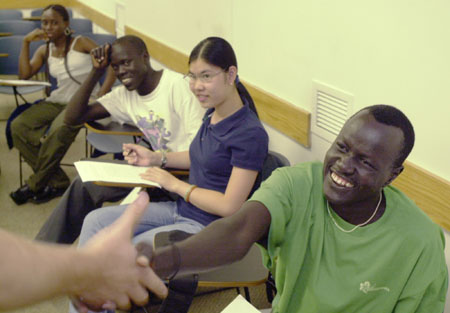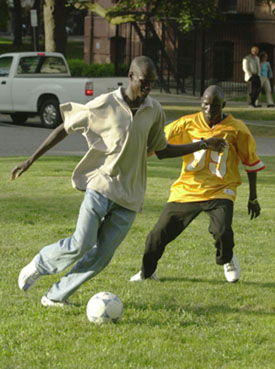‘Lost Boys’ find their way to Harvard

Fata Nhail reaches up and hooks his fingers around a water pipe near the ceiling of the basement room in Grays Hall, one of those being used for evening classes by the Refugee Youth Summer Enrichment Program (RYSE).
Nhail’s tall, lanky body seems in constant motion as he fidgets and shifts his weight – hardly unusual for a 16-year-old. Nor is there anything out of place about his clothing – sneakers, baggy jeans, and a black T-shirt emblazoned with the letters “FBI.” But Nhail has traced a long and harrowing path before reaching this apparent normalcy.
Nhail is a member of the Nuer tribe of southern Sudan. When he was 5, government troops attacked his village and he fled along with other boys, eventually ending up in Ethiopia. Sudan has been devastated by civil war since 1983, pitting the Muslim government of the north against the Christian and animist Nuer and Dinka tribes of the south. In addition to being an ethnic conflict, it is also a war over control of oil reserves that could improve living conditions in poor and undeveloped southern Sudan.

As the war went on, thousands of Sudanese boys, refugees like Nhail, struggled toward the safety of Ethiopia, menaced by thirst and hunger as well as by lions, crocodiles, and enemy soldiers. Shunted from one country to another, the 5,000 survivors of the 33,000 who originally fled Sudan ended up in a refugee camp in Kenya called Kakuma. They have since become known as the “Lost Boys” of Sudan.
The “Lost Boys” are now being resettled in the United States. They are living in group homes and foster homes in cities and towns across the country, struggling to make the transition from the traditional cattle-herding lifestyle of their childhood to a new life as American teenagers.
“It’s very nice here. People are very nice” says Nhail, who has been in the United States for eight months. He learned British English in the Kenyan refugee camp and still has trouble with American pronunciation.
“Yes, people are very friendly to one another,” says Nhail’s friend, 18-year-old John Kuol. “In class we all talk about the countries we come from.” Kuol, who is from the Dinka tribe, has large, brilliant black eyes that confront his listener with startling force and directness.
The student volunteer group RYSE is helping Nhail, Kuol, and other Sudanese boys living in the Boston area to navigate the unfamiliar terrain of high school. It is helping other refugee youth as well, from places as diverse as Colombia, Somalia, China, Vietnam, and Kosovo. Every weekday evening during the summer, these youngsters gather for English classes, taught by enthusiastic Harvard undergraduates.
Nhail and Kuol’s class is being taught by sophomore Mary Ziegler and junior Michael Palmer. They are reviewing vocabulary words and doing it in the form of a quiz show.
“Welcome to the RYSE vocabulary bee,” says Palmer. “And here’s our host, Mary Ziegler!”
“I’ll give you the word and you have to give the meaning and spell it. Three mistakes and you have to sit down. The last one standing is the winner,” Ziegler says.
“Tell them what they’ll win, Mary,” Palmer says.
“This is what you’ll be playing for, this delicious Kit Kat bar.”
The words are not easy. The first one is “deter.” Veronica Gil-Duran from Colombia spells it right but misses the meaning. Next is “enthusiasm.” Yin Zhao from Beijing defines it correctly but spells it wrong. Ardian Ramadani from Kosovo manages to spell “paranoia,” but when asked for the meaning, replies frankly, “I have no idea.” “An unreasonable fear,” volunteers John Kuol. “That’s a beautiful definition!” exclaims Ziegler. Kuol does a little victory dance, turning around in place.
The contest continues, with more misses than hits, but often they are near-misses and show thought and insight. Drilan Loxha from Kosovo thinks that “mutant” means “silent” because he perceives the word “mute” in it. Mama Kaba from Somalia spells “devotion” correctly but confuses it with “divorce.”
Gil-Duran ends up the winner. She shares her Kit Kat bar with her friend and fellow Colombian Sara Oviedo.
“The ethnic populations we served have changed,” said RYSE volunteer Hourng Ngec Kaing ’03.
When the organization started in the mid-1990s, the majority of refugee youth in need of help making the adjustment to life in the United States were from Southeast Asia.
“Now most of the Southeast Asians have moved up and the new refugees are mostly from Africa and the Balkans,” Kaing said.
Many of these youngsters are highly motivated and have impressive verbal skill. Many of them are impatient to fit into mainstream classes in their local schools. Luckily, RYSE is there to help them make the transition more quickly.
In addition to English classes, RYSE offers individual tutoring and help with standardized tests like the MCAS and SAT. RYSE volunteers also take the students on field trips. John Kuol is impressed by the amount of time the volunteers devote to these activities.
“Sometimes we don’t get home until midnight, and so the teachers do not get home until 2 or 3 in the morning,” he says.
Adjusting to life in America has had its rough spots. Nhail says that at first he was disturbed by how unruly American high school students were and how much time was wasted as teachers tried to restore order.
“In Kenya nobody was allowed to talk during the lecture,” he says.
Yin Zhao, who lives with his parents in East Boston, complains of loneliness. Most of the kids in his classes are Latino and speak Spanish to one another. He feels left out. Even at the Chinese church he attends with his parents, most of the congregation are from southern China and speak Cantonese. As a Mandarin speaker, Yin Zhao finds this dialect incomprehensible.
In addition to academic instruction, RYSE also offers refugee youth a chance to overcome some of these difficulties, to get together with others who share their backgrounds as well as learn from those who may come from the other side of the world but have difficulties and challenges in common. It’s an opportunity for which many of these youngsters feel grateful.
“I really appreciate what they do for us,” says Nhail.




